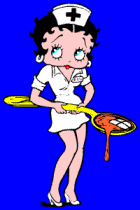December 27th, 2009 by Dr. Val Jones in Health Tips
3 Comments »
 Regular readers know that I’ve been promoting healthy lifestyle choices since this blog’s inception. In fact, I even used to lead a weight loss group called “Lose 20 pounds with Dr. Val.” I’ve often joked that because of the law of the conservation of mass, when someone loses weight, someone else must “find” it. And well, I guess I realized – looking towards 2010 – that I had found some of that weight myself!
Regular readers know that I’ve been promoting healthy lifestyle choices since this blog’s inception. In fact, I even used to lead a weight loss group called “Lose 20 pounds with Dr. Val.” I’ve often joked that because of the law of the conservation of mass, when someone loses weight, someone else must “find” it. And well, I guess I realized – looking towards 2010 – that I had found some of that weight myself!
If healthcare reform debates teach us one thing, it’s this: the future of healthcare coverage is uncertain for all of us, so the most important thing we can do is avoid needing it (if at all possible)! Time to turn that into a New Year’s resolution… so here’s what we can do: Read more »
September 29th, 2009 by BarbaraFicarraRN in Better Health Network, Health Tips
No Comments »

 This post isn’t being written to frighten you or to cause you to mistrust hospitals.
This post isn’t being written to frighten you or to cause you to mistrust hospitals.
It’s to make you aware that medical errors do occur, but there are steps that you can take to help prevent medical errors from happening.
First, some vital information
According to a recent investigation by the Hearst Corporation, a staggering 200,000 Americans will die each year from preventable medical errors and hospital infections. This report comes ten years after the highly-publicized report, “To Err Is Human” which found 98,000 Americans were dying each year of medical errors. Instead of the number of medical errors decreasing, it nearly doubled.
Read more »
*This blog post was originally published at Health in 30*
June 9th, 2009 by Bryan Vartabedian, M.D. in Better Health Network
No Comments »

Let’s face it, Twitter isn’t that hard to figure out. The interface is intuitive and a little time on the application makes its basic function pretty obvious. But there are a couple of things that medical newbie’s might keep in mind before taking the leap on to Twitter. While I didn’t find myself in any kind of trouble, I had to figure a few things out on my own.
1. Follow and listen. Twitter is as much about listening as it is about talking. The best thing you can do to see how doctors are using microblogging to advance their platforms, practices and passions is look and listen. Pick a group of doctors (look at my follow list for some ideas) and follow them for a couple of weeks to see exactly what they do and how they interact with others. Don’t reinvent the wheel.
2. Goof around now, but ultimately think how you want to use it. You likely won’t have any idea about how to use Twitter when you first jump in. And that’s okay. You can’t understand it’s power until you reach a sweet spot of followers and cultivate relationships that have some history and meaning (in Twitter terms, of course). Ultimately you do want to think about connecting with those who will put you where you want to be – whether it’s just raising your profile as an author or specifically drawing patients for lapband surgery, or whatever. But also keep in mind that you may start by goofing off and never stop … like me.
3. You can follow whoever you darn well please. The world is full of self-ordained social media experts who spend their days working to make you feel like you don’t follow enough people. If you’re a physician with a real job you’re too busy to follow 30,000 people. Keep your eye on the ball and think about the network you want to develop. Whatever you do, don’t believe the nonsense that it’s ‘bad etiquette’ to not follow someone who follows you.
4. Your patients and your hospital are listening. Social media is interesting. While we type in the privacy of our boxer shorts, the world reads what we write. And that includes your patients. While my grandmother used to tell me before going out, ‘don’t do anything you wouldn’t do in front of the Virgin Mary, I’m telling you, don’t Tweet anything you wouldn’t want your patients to see. You represent your personal brand, practice, and profession with that very first tweet. Keep in mind that some hospitals have social media/blogging policies. You might look into this before taking the plunge. If you keep your hospital/institution off your bio, commit to never discuss anything relating to patients and always vow to be a really nice guy you should be good.
5. What happens on Twitter stays on Twitter. Remember that everything you type will remain etched in the infosphere for eternity. This can be retrieved by future employers, partners, soon-to-be-ex-spouses or anyone else interested in seeing or exploiting what you’re really about. Exercise intelligent transparency. Be smart and use your frontal lobe before hitting ‘update’.
I was interviewed by the AMA News last week on doctors and Twitter and that’s what got me thinkin’ about this post. I get a charge out of helping doctors recognize the power of connecting beyond their immediate environment. I hope this helps.

*This blog post was originally published at 33 Charts*
June 5th, 2009 by MotherJonesRN in Better Health Network
No Comments »

 I wrote this post a long time ago when I first started blogging. I’m recycling the post because this information bears repeating. I’ve been seeing some behavior lately that is inappropriate, and I’m telling you this stuff for your own good. Please, never roll your eyes at a nurse who is old enough to be your mother. She may be going through menopause, and it could be the last thing that you ever do. Just sayin.’ Don’t make waves at the nurses station.
I wrote this post a long time ago when I first started blogging. I’m recycling the post because this information bears repeating. I’ve been seeing some behavior lately that is inappropriate, and I’m telling you this stuff for your own good. Please, never roll your eyes at a nurse who is old enough to be your mother. She may be going through menopause, and it could be the last thing that you ever do. Just sayin.’ Don’t make waves at the nurses station.
I worked as a neurosurgical nurse many years ago at a teaching hospital in the Midwest, and twice a year a new crop of interns descended upon our unit. It was the best show in town. The spectacle began with the chief of neurosurgery, Dr. Holier Than Thou, strutting on to the unit with his entourage marching behind him. He stood before the crowd in his impeccable white lab coat, telling everyone within earshot of his importance, and how he held the power of life and death in his hands. I would sit at the nurses station and snicker at the biannual parade, and remembered my first day in the hospital as a nursing student. Two interns had asked me to go into a patient’s room to get a set vitals signs. They didn’t tell me that the patient was cold, stone dead. I walked into the patient’s room, saw the dearly departed, and calmly walked back to the nurses station to find the interns laughing their fannies off. I told them they were going to make damn good doctors one day, but first they had to learn what rigor mortis looked like. Nonetheless, because every new group of interns looked like lambs being lead to slaughter, I pitied them, and I gave them information to use as a survival guide. These are the rules I taught them about working with nurses.

1) Nurses deserve respect. We are with the patients twenty-four hours a day, seven days a week, while doctors are only able to see patients a few minutes a day. Smart interns forge alliances with the nursing staff, and understand that nurses can save their butts when something goes wrong with one of their patients.

2) Don’t take the last piece of pizza in the nurses lounge unless you are invited to do so. Nurses are territorial about food.

3) Nurses do not tolerate interns with a budding God complex. Nurses have no problem calling arrogant interns every hour on the hour for Tylenol orders, especially at night. Arrogance breeds contempt.

4) Don’t be stupid. If you want to complain about nursing care, be careful when you approach a nurse who is working the last half of a double shift. Refer to rule #3.

5) Nurses are your friends. We want to see you succeed, and if we like you, we will make sure that Dr. Holier Than Thou doesn’t find out that you order Demerol 1000 mg, instead of 100 mg, IM q 4 hours PRN because you were dead on your feet after being on call for three days in a row.

*This blog post was originally published at Nurse Ratched's Place*
May 28th, 2009 by MotherJonesRN in Better Health Network
No Comments »

Nurses are experts at navigating through rough waters. We are always there for our patients in their time of need. Check this nurse out. She is using her critical thinking skills while she sails her boat through a stormy ocean. It’s true. Nurses can do just about anything, just so long as they have a good mentor to show them the way.
From time to time, I get letters from new psych nurses asking me for advice.
I was very lucky when I first started out as a psych nurse. Nurses and doctors who gave me valuable tips when I was new in the field surrounded me on the unit, and made sure that I didn’t get myself into trouble. Here are some pearls of wisdom that my mentors passed onto me when I was the new kid on the block. I hope they help you, too.
Pearl of wisdom #1: The first rule that I learned was that I never was to accept abuse from a patient. Patients may be angry about how things are going in their life, but they must learn to vent their anger appropriately. That means no hitting, swearing, or throwing stuff at other people. Period! Just because someone has “problems” doesn’t give them a license to act inappropriately on the unit. Seriously. Nurses are not punching bags. We have rights. Nurses must teach their patients to function in the real world, and we do them a disservice if we allow our patients to act out on a psych unit.
Pearl of wisdom #2: The second pearl of wisdom has to do with the myth that nurses can say something wrong to a psych patient. Many nurses are afraid that a patient will crumble if they say the wrong thing to the wrong person. I’ve never seen this happen during my nursing career. Just listen to your patients with your ears and with your heart. Everything else will fall into place.
Pearl of wisdom #3: Never turn your back on a patient. This is self explanatory. Psych units are unpredictable.
Pearl of wisdom #4: Don’t get offended if a patient hates you. That probably means that you are doing your job. Many patients come to the hospital because they have boundary issues, and issues involving the need for immediate gratification.
Pearl of wisdom #5: Never forget that you are a REAL nurse. You may not be caring for a wounded body, however you are caring for a wounded soul.

*This blog post was originally published at Nurse Ratched's Place*
 Regular readers know that I’ve been promoting healthy lifestyle choices since this blog’s inception. In fact, I even used to lead a weight loss group called “Lose 20 pounds with Dr. Val.” I’ve often joked that because of the law of the conservation of mass, when someone loses weight, someone else must “find” it. And well, I guess I realized – looking towards 2010 – that I had found some of that weight myself!
Regular readers know that I’ve been promoting healthy lifestyle choices since this blog’s inception. In fact, I even used to lead a weight loss group called “Lose 20 pounds with Dr. Val.” I’ve often joked that because of the law of the conservation of mass, when someone loses weight, someone else must “find” it. And well, I guess I realized – looking towards 2010 – that I had found some of that weight myself!


 This post isn’t being written to frighten you or to cause you to mistrust hospitals.
This post isn’t being written to frighten you or to cause you to mistrust hospitals.















